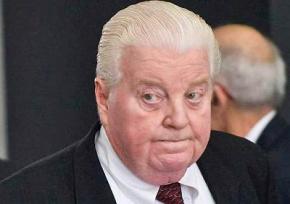Justice delayed in Burge case
In late June, activists celebrated as former Chicago police Lt. Jon Burge was found guilty of lying under oath and obstruction of justice by a federal jury.
Burge led a ring of cops who tortured more than 100 African American suspects in the 1970s and '80s--leading to countless coerced confessions. Around a dozen Burge victims lost years of their lives on death row. Nearly two dozen men tortured by Burge and his underlings remain in prison to this day.
Burge's trial lasted for five weeks, during which time five former torture victims testified about how they signed false confessions after being suffocated, electrically shocked, beaten and threatened with guns placed in their mouths. But although he was supposed to be sentenced in November 5, the court has delayed Burge's sentencing--he continues to walk free in the meantime.
, a victim of police torture who spent 28 years in prison for a crime he did not commit and now an organizer for the Campaign to End the Death Penalty, asks why justice is being delayed once again.
WORD WAS slowly released last week among activists that sentencing for notorious police torturer Jon Burge would be delayed into the new year. This has caused some to grow upset and to ask the question, "How could Burge be given even more time to roam the streets?"
Burge's sentencing has been delayed until January 20, 2011, after a request by federal prosecutors. It is unclear why they requested the delay, which has been granted.
Burge was convicted on June 28, 2010, for lying about the torture that occurred while he was a police commander. Burge has also been accused of participating in acts of torture on criminal suspects brought into questioning at the Area Two and Three violent crime units in Chicago.
What is clear is that Burge could remain a free man until well after April, because most of those convicted in federal courts are granted 90 days to report to the federal prison after sentencing.
This is not justice for the 23 men who remain incarcerated as a result of torture that occurred on Burge's watch. Some of those men have been incarcerated more than 30 years for crimes that they may be innocent of, based on faulty confessions obtained after being tortured.

Evidence in these cases reveals that these men were brought into police custody for questioning in connection with a crime and, while at the police station, were beaten and tortured into repeating or signing incriminating "confessions." For more than a decade, these men have requested hearings on their claims of torture--which the Cook County State's Attorney's office, the office of the Illinois Attorney General, and the Cook County special prosecutor have denied to most.
None of these men--including Stanley Wrice, Javan Deloney, Grayland Johnson and Eric Caine--have been granted a hearing on their claims of torture, despite investigative reports which establish that Burge and a ring of detectives beat and tortured African American and Latino suspects. Neither Burge nor any of the officers on his "team" accused of committing acts of torture are Black.
Burge should not be shown any special treatment from the courts or prosecutors. As Tomika Erby, a community activist and Northwestern University School of Law intern, said, "Why should these men be locked up while Burge roams free? It's not fair."
Twenty-three men, their children and their families continue to suffer, while Burge remains free. Activists are vowing to continue to mobilize events to free those men from prison. They are remaining focused on Burge's upcoming sentencing hearing, as well as his $37,000 yearly pension from the city of Chicago--a pension that he continues to receive, despite being a torturer and convicted liar.


